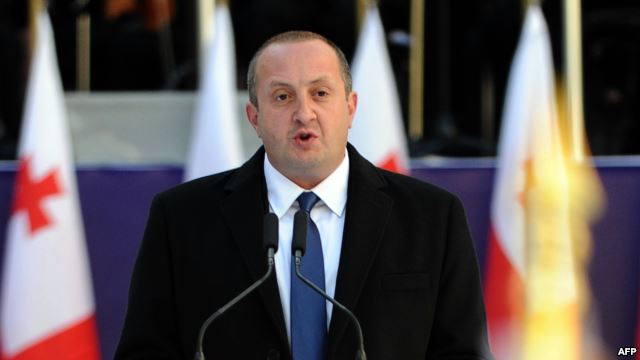
Georgia’s Association with the EU: Start of a Complicated and Hazardous Journey
Publication: Eurasia Daily Monitor Volume: 10 Issue: 215
By:

During the third Eastern Partnership summit in Vilnius, on November 28–29, the European Union’s High Representative for Foreign Affairs and Security Policy Catherine Ashton and Georgia’s Foreign Minister Maia Panjikidze initialed the Georgia-EU Association Agreement as well as the deal on a Deep and Comprehensive Free Trade Area. The ceremony confirmed the conclusion of all technical procedures prior to the actual signing of the agreement. President Giorgi Margvelashvili spoke at such a high-profile ceremony for the first time since his election on October 27 (https://www.civil.ge/eng/article.php?id=26735).
Apart from hailing the agreement, President Margvelashvili focused his speech on the primary practical result of the Vilnius summit for Georgia, as the country takes on responsibilities for active participation in international peacekeeping missions under the aegis of the EU (https://www.civil.ge/eng/article.php?id=26740). The new president thereby confirmed that Georgia would remain an unwavering Western ally—just as it had been in the mission in Afghanistan, where Georgia made many sacrifices (https://www.civil.ge/eng/article.php?id=26535).
The initialing of the Association Agreement, however, does not guarantee that it will be signed next year, as many people in Prime Minister Irakli Garibashvili’s government promise (https://en.trend.az/regions/scaucasus/georgia/2215622.html). Even if the document is signed in 2014, its implementation will be connected to immense hurdles: “We will have to pass 350 laws in many spheres within several years in order to comply with the norms of the European Union,” Levan Berdzenishvili, a member of the ruling Georgian Dream coalition in parliament, told Jamestown (Author’s interview, November 30). Moreover, progress in the legal, economic and human rights spheres will be expected of Georgia even prior to the document’s signing (https://www.ekhokavkaza.com/content/article/25184906.html).
Many observers believe the main problems and hurdles for Georgia will arise in the interim period after initialing and before the actual signing of the agreement.
As the events in Armenia (see EDM, September 5, 6, 11) and Ukraine (see EDM, November 22) show, Russia has strong instruments for putting pressure on its neighbors and is prepared to make use of them to keep the countries of the post-Soviet space from moving closer to Europe (https://www.regnum.ru/news/1084377.html).
Georgia with its frozen conflicts, weak economy and absence of natural resources may turn out to be the most vulnerable of all. “Initialing the document in Vilnius does not give [Georgia] anything in terms of greater security. On the contrary, it might increase the risks connected to Russia’s displeasure,” the rector of the Diplomatic Academy of Georgia, Iosif Tsintsadze, told Jamestown. Yet, Tsintsadze considered the initialing of the document as “the first practical and very useful step toward European integration” (Author’s interview, November 29).
Moscow has an extensive range of instruments to pressure Georgia’s government into not signing the agreement next year. Russia could resume its embargo on all imports from Georgia—something that partially happened in the Ukrainian case. However, this is Moscow’s weakest option as the Georgian economy depends much less on exports to the Russian market than the Ukrainian economy. Paradoxically, in the run-up to the initialing of the agreement between Georgia and EU, Russia lifted all restrictions on its imports of Georgian wine, mineral water and fruit produce, thereby removing the tacit sanctions that were implemented back in 2006 (https://www.vestikavkaza.ru/analytics/Gruzinskie-mandariny-i-yabloki-vernutsya-v-Rossiyu.html).
Nonetheless, analysts in Tbilisi are convinced that this is just a prelude to a new trade war. “Moscow wants to show Georgian producers how profitable trade with Russia can be, so that when Georgia approaches the signing of the Association Agreement with the EU, the [resumption of sanctions will be] more painful,” Nika Imnaishvili, an expert with the information agency GHN, told Jamestown. Still, according to Imnaishvili, “After 2006, Georgian businesses managed to diversify their exports and found new markets. And the resumption of the embargo will not become a critical factor in delaying the signing of the agreement, as happened in Ukraine” (Author’s interview, November 25).
Moscow’s second trump card is connected to the rise of pro-Russian political forces within Georgia. “These forces exist. They are currently in hiding and are not active because they are waiting for the right moment. This moment will come when Moscow orders them to come out openly,” David Darchiashvili, an opposition parliamentarian of the United National Movement (UNM), claimed in an interview with Jamestown. Darchiashvili noted that the number of people who oppose Georgia’s Association Agreement with the EU does not exceed 10 percent—the same proportion of the electorate that voted for the “former speaker of the parliament, Nino Burjanadze, who met with Vladimir Putin in Moscow on several occasions.” Darchiashvili added that “the order from Moscow to the pro-Russian forces [in Georgia] will arrive in the run-up to signing the agreement. He recalled that at the Association Agreement’s initialing stage, “Ukraine also did not experience any pressure [from Russia],” unlike later when it came time to sign the documents (Author’s interview, November 30).
The main danger for Georgia, however, comes from the frozen conflicts with Abkhazia and South Ossetia. “Moscow may well make use of them to increase military and political tensions,” according to Irakly Aladashvili, the editor of the independent journal of military analysis Arsenali (Author’s interview, October 6).
In the past weeks, Russian border guards ramped up the so-called process of “borderization” by putting up barbed wire fences along the line separating Georgia from the occupied territory of South Ossetia (https://www.vestikavkaza.ru/analytics/Gruzinskie-mandariny-i-yabloki-vernutsya-v-Rossiyu.html). In some areas, the “border” might encroach on the strategic highway that connects Eastern Georgia with the capital city of Tbilisi, as well as Armenia and Azerbaijan with the Black Sea ports of Poti and Batumi. Moreover, parts of the strategic oil pipeline that connects Azerbaijan and Georgia will end up on territory under Russian control (https://www.cacianalyst.org/publications/field-reports/item/12822-russia-continues-border-demarcation-in-south-ossetia.html).
Meanwhile, ethnic Georgians accused of “illegally crossing a state border” continue to be arrested in South Ossetia. Whereas the region’s former separatist leader Eduard Kokoity regularly appears in the Russian press threatening to capture more Georgian territories, including the Kazbegi district and Truso Valley, which are close to the Russian-Georgian border (https://ghn.ge/news-94273.html). And in breakaway Abkhazia, the separatists ramped up the process of stripping ethnic Georgians of Abkhazian passports, possibly paving the way for another round of ethnic cleansing in this region (see EDM, October 3).
It is unclear whether the Georgian authorities will be able to withstand the pressure that is bound to grow exponentially as the date for signing the agreement with the EU approaches. However, without support from the international community and clear signals by Brussels to Moscow, Garibashvili’s government will certainly find it incredibly difficult to respond to all the challenges related to Georgia’s European integration.




